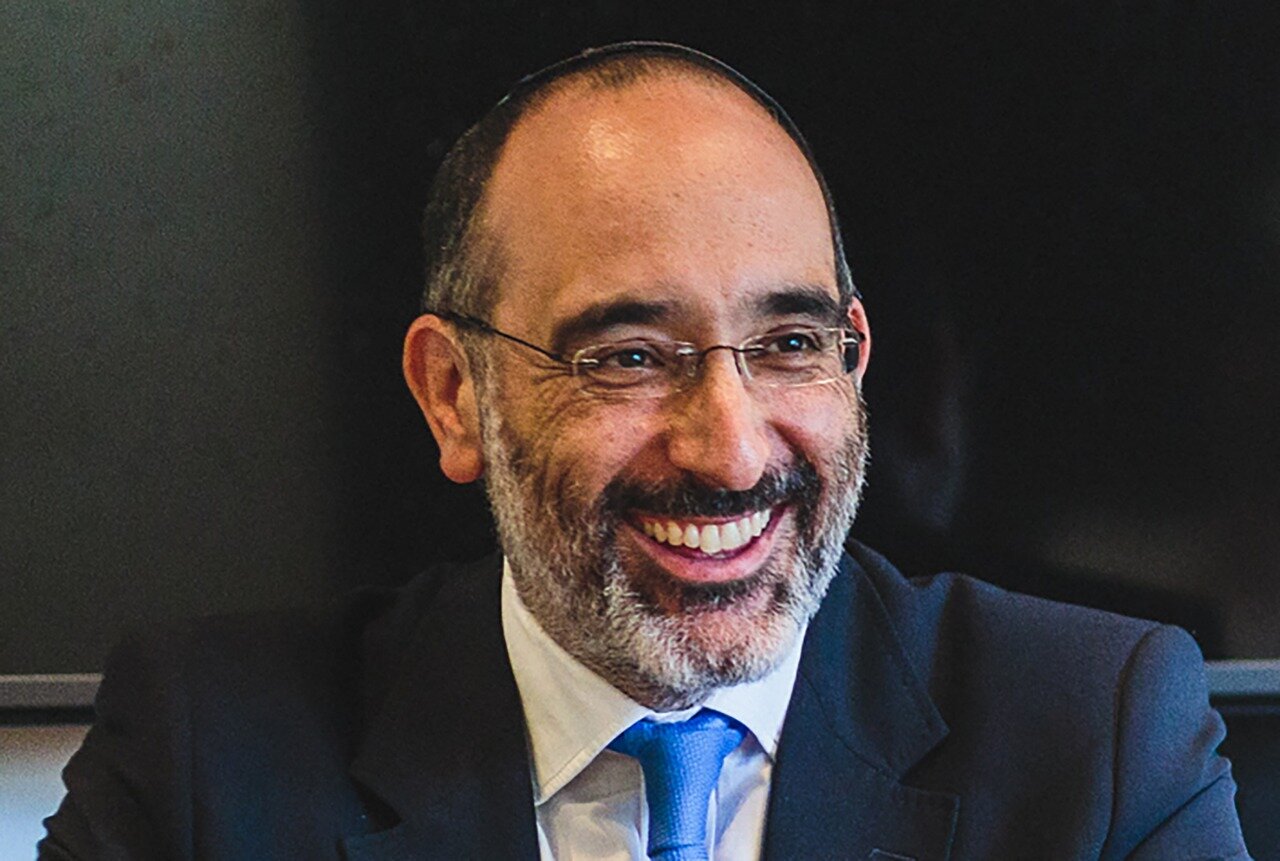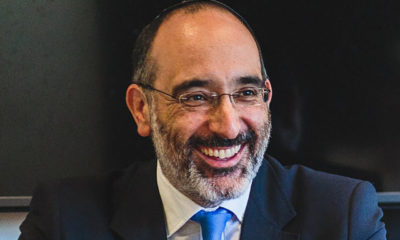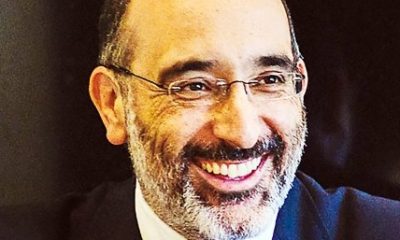
Question and Answer

Speaking out against the government – right or wrong?
Published
3 years agoon
Chief Rabbi Dr Warren Goldstein wrote a piece in Business Day on 29 June criticising the government for its slow vaccine rollout. It got a mixed response, but some felt strongly that he shouldn’t have done it. The SA Jewish Report questioned him about it.
1. What inspired you to write an op-ed in a mainstream newspaper about vaccines?
Government’s negligence in vaccinating this country goes beyond politics. It’s a moral issue, a matter of life and death that touches on one of the cornerstone values of the Torah – the sanctity of life. We know that pikuach nefesh, saving lives, is paramount, and that “to save one life is to save a world”. Every day of delay means more people die. It’s that simple. Had the government vaccinated South Africans at the rate it should have, we wouldn’t be suffering the death and widespread serious illness of this third wave.
2. Why did you blame the government for it?
The government insisted on running the procurement and rollout. Responsibility for its failure lies with it. At the same time, this isn’t a blame game, that was never my objective. I wrote it to add my voice to the public pressure while there’s still time to prevent further suffering and death from a fourth wave, which may be only a few months away.
3. What purpose did you believe an opinion piece like this would serve?
When public pressure around an issue increases, in a vibrant democracy, it can shape and influence government action. My article adds to that public pressure. Since publication, various other public figures have come forward to criticise the government, including Professor Shabir Madhi, one of the country’s top experts in this field, who echoed my accusation that the government has blood on its hands for bungling the vaccination campaign. Public pressure is building.
4. What reaction did you get?
The article has resonated with many people within and beyond our community who fear serious illness and death and feel utterly vulnerable to government’s vaccination failures.
5. Professor Barry Schoub, a leading virologist, took you on publicly in the media for the piece you wrote. Why do you believe he did this?
He obviously disagrees strongly with the views I put forward in my article. He believes the government’s vaccination programme has progressed well.
6. How do you feel about him doing this?
The open exchange of ideas and airing of different perspectives can only be a good thing for our country. People can then make up their own minds about whether they agree with Professor Schoub that the government’s vaccine rollout has been well-executed.
7. He pointed out numerous points you made, claiming they weren’t true and correcting them. What’s your response?
Nothing in my article was untrue. I had two professional researchers check my facts. Not a single fact in my article has been successfully challenged or overturned. Actually, since publication, various national experts, in letters to the newspaper, have defended the facts in my article and refuted the points raised by Professor Schoub. And Professor Madhi, an internationally recognised virologist and former president of the World Society of Infectious Diseases, has reaffirmed a number of the points I made, especially the government’s terrible mistake in selling off our supply of the AstraZeneca vaccine. Contrary to Professor Schoub’s support for the government’s decision, Professor Madhi, who in fact led the AstraZeneca trials, said “there was a complete blind spot to the critical evidence” regarding the vaccine’s efficacy and safety, and that the government ignored the recommendations of the World Health Organization, directly causing untold extra hospitalisation and death.
8. How do you feel now about the vaccine situation?
The vaccination rate remains desperately low. Unless we dramatically speed up vaccine procurement and rollout, we will suffer further serious illness and death. More pressure must be put on the government. Lives are at stake.
9. Have you had any response from the government?
No formal response, but senior politicians from within the African National Congress have told me in private that they support the position I’ve taken. It’s important to realise that there are many in the government who aren’t happy with the state of affairs on vaccines – or, for that matter, government’s stance on Israel. If we keep silent, how can they speak up? We must be bold, and stand up for what’s right so that we inspire others to do the same and strengthen the hand of the many good people in government.
10. Why do you believe it’s important for you to be vocal about issues of government that you believe are wrong?
Silence is acquiescence. This was true during the days of apartheid, when our official community organisations were silent right up until the end. It was Chief Rabbi Rabinowitz who had the courage to challenge the apartheid government. It was true, also, during the Zuma presidency, when state capture and government corruption were almost normalised. Official community organisations were again silent, and I was the one who publicly called on President Jacob Zuma to resign, joined the protest movement, and even amended the prayer for government that we say on Shabbos so as not to pray for the president. I believe it’s important to speak up for truth and justice, whether the issue is a racist regime, a corrupt government, or a negligent vaccine rollout in the midst of a deadly pandemic.
11. Many in our community might say that, as Jews, we shouldn’t rock the boat in this country. What’s your reaction to this?
We cannot adopt a ghetto mentality of defensiveness and fear. What do we have to fear? This isn’t Putin’s Russia or Communist China. It’s a free country with freedom of speech, a free press, robust, independent courts, and those rights and freedoms are enshrined in our Constitution. My public challenge to the government is rooted in an optimism and faith in South African freedom and democracy.
With the right approach, we can make a difference. Many of the critics have a misguided strategic understanding of how to influence the government. They believe we need to tread lightly, talk softly and meekly. But when it comes to government relations with Israel, we’ve seen how ineffectual this approach really is. Indeed, in spite of years of gentle, non-boat-rocking diplomacy, the government’s approach to Israel remains unchanged, as demonstrated by its deeply hostile and one-sided comments on the recent Gaza conflict. Clearly, the quiet, behind-the-scenes strategy has failed, and will continue to fail. It’s incumbent on leaders to speak up, to be bold, and make our views clear to the government. Seeking to appease and placate the government isn’t just a betrayal of personal integrity, it’s not even a successful strategy. In any robust democracy, governments expect robust criticism. That’s how a free society works. If we have the self-respect to tell the truth and stand up for ourselves, there’s more chance the government will learn to respect us
12. Many have criticised you for being so vocal against the government in this regard. How do you feel about the criticism?
My speaking out is good for our community because the interests of the Jewish community and South Africa as a whole are aligned. A negligent vaccine rollout is, equally, a threat to South Africa and the Jewish community, as was state capture and apartheid. To speak out on these issues is, therefore, in the ultimate best interests of the Jewish community. We aren’t an island unto ourselves. Our destiny is intertwined with South Africa. If this country thrives, then we as a Jewish community will thrive. And if it fails, then so will our community. We cannot be silent when the future of our country depends on making our voices heard. We must fight for a better country. And we do that by joining the public debate. I’m optimistic. We can make a difference. Change is possible.











laura joselowsky
Jul 8, 2021 at 12:28 pm
Totally on point!!
Very well articulated and true.
Well done for the initial letter and this follow up
Thank you
Melanie Falkof
Jul 9, 2021 at 7:56 pm
Kol hakavod Rabbi … thanks for speaking out loud and clear
I applaud you..
anonymous
Aug 16, 2021 at 6:45 pm
agreed and another issue should be addressed re South African Jews or any cannot enter Israel even if been vaccinated, lots of SA parents have kids who are atudents there and not citizens yet , i never ever thought no matter what as being a Jewish person I would not be able to go to zisrael , and now corona and vaccinated cannot even visit kids because they are students , think many parents have same issue and this should be addressed